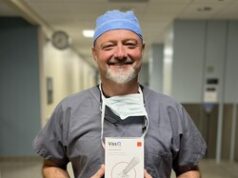 The VasQ external support device (Laminate Medical) has demonstrated long-term benefits for radiocephalic (forearm) arteriovenous fistula (AVF) creation in a retrospective analysis of 150 consecutive procedures. Robert Shahverdyan (Asklepios Klinik Barmbek, Hamburg, Germany) and Dirk Hentschel (Brigham and Women’s Hospital, Boston, USA) have published these data in Seminars in Dialysis.
The VasQ external support device (Laminate Medical) has demonstrated long-term benefits for radiocephalic (forearm) arteriovenous fistula (AVF) creation in a retrospective analysis of 150 consecutive procedures. Robert Shahverdyan (Asklepios Klinik Barmbek, Hamburg, Germany) and Dirk Hentschel (Brigham and Women’s Hospital, Boston, USA) have published these data in Seminars in Dialysis.
The VasQ device is implanted around the connection between the vein and artery of an AVF to promote maturation into a functional access for haemodialysis. Standard fistulas have reported failure rates to become functional for haemodialysis as high as 60% within the first year, as per a press release from Laminate.
However, the newly published data demonstrate that implanting VasQ resulted in 90% of fistulas being used for dialysis within a median of 41 days, and 84% maintaining secondary patency out to 36 months. The results suggest, according to Laminate, that the addition of VasQ to Shahverdyan and colleagues’ standard of care has helped haemodialysis patients receive more functional fistulas that are durable over the long term.
“I am excited to share these data, which build on my previous publication that demonstrated the short-term benefit of VasQ to reduce my primary failure rate,” Shahverdyan said. “Now, we see the early success with VasQ translated to the long-term benefit of more patients retaining a functional fistula out to three years.”
“I was excited to partner with Robert on this publication,” Hentschel added. “The data supporting VasQ’s use in creating usable fistulas continue to build. I am looking forward to having this technology available for use in US patients.”
Laminate is currently completing a US pivotal study and preparing its submission for market clearance to the US Food and Drug Administration (FDA) for review.










